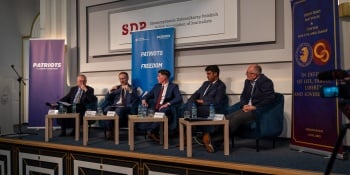Published: 17.12.2021

· An event took place in New York to mark the second anniversary of the Nairobi Conference. The event was dedicated to promoting the radical demands of the so-called ‘Sexual and Reproductive Health and Rights’ (SRHR) movement, including abortion as a method of family planning.
· Imposition of the Nairobi Gender Statement on states was prevented by representatives of some twenty governments at a conference in Kenya in 2019.Representatives of the Ordo Iuris Institute were also present at this conference.
· The commemoration of the second anniversary of the summit was an opportunity to reiterate the radical demands and uphold the commitments made two years ago by representatives of many countries and institutions, including UN agencies.
On the occasion of the second anniversary of the so-called 'Sexual and Reproductive Health and Rights’ ICPD+25 summit in Nairobi, a commemorative conference was held in New York on 16th November. On this occasion, the first report was announced of the High Commission for the Nairobi Summit (the body set up to monitor and coordinate progress on the implementation of the 2019 objectives adopted in the Kenyan capital). Among the demands presented were the introduction of sex education in the national curriculum, the introduction of facilitated access to abortion (even for minors), and the abolition of the conscience clause.
The event was attended by such individuals as: Dr Natalia Kanem - Executive Director of the United Nations Population Fund (UNFPA), Dr Jakaya Mrisho Kikwete - former President of Tanzania, Flemming Møller Mortensen - Minister of Development of the Kingdom of Denmark, and Michaëlle Jean - former Governor General and also Commander-in-Chief of the Canadian Armed Forces. The event also featured panel discussions with invited activists and campaigners.
In his speech, President Kikwete stressed that ‘promises made in Nairobi must be kept’, and acknowledged that the coronavirus outbreak had significantly delayed ‘progress’ in implementing the SRHR concept. Michaëlle Jean, meanwhile, said that ‘reproductive and sexual rights and health are a key dimension of life that defines us, determines our development and ensures our well-being’.
The High Commission's published report largely uses the radical language characteristic of documents associated with the Nairobi Summit agenda and wider circles promoting the concept of SRHR. As early as the introduction to the relevant section of the report, there is a call for the Commission to create ‘a global agenda for sexual and reproductive justice requiring the deliberate overcoming of all barriers to the exercise of rights and the achievement of bodily autonomy’. Next are statements suggesting ‘the profound inequality of the modern world and the need for accelerated implementation of the Nairobi resolutions’.
Among the goals set for the coming years, there is a demand for increased funding (both within individual countries and internationally) to achieve the aforementioned ‘sexual and reproductive justice’, as well as the goal of creating ‘new narratives’ around this concept, which would serve to make it a ‘battle cry’ that would mobilise crowds and inspire action.
- “It should be stressed that the document is notable for its notorious linking of the SRHR concept with the idea of justice, the legal, cultural or philosophical basis for which is not clear. The exact phrase ‘sexual and reproductive justice’ alone occurs as many as seventy times in the document”, stresses Patryk Miernowski, an analyst at the Ordo Iuris International Law Centre.

14.05.2025
• In Nairobi, the 2nd Pan-African Conference on Family Values is taking place with the participation of representatives from Ordo Iuris.

09.05.2025
• Representatives of the Ordo Iuris Institute will participate in the Pan-African Conference on Family Values, which will begin on May 12 in Nairobi, the capital of Kenya. Ordo Iuris is a partner of the event.

07.05.2025
• The European Court of Human Rights has upheld a complaint by a same-sex couple whose Polish registry office refused to register a marriage contracted in the United Kingdom. This is the fourth judgment in which the ECHR indicates that Poland has an obligation to ensure that same-sex couples can formalize their cohabitation.

02.05.2025
· The Ordo Iuris Institute, the Hungarian Center for Fundamental Rights, and the Foundation of the Patriots for Europe group in the European Parliament organized a conference in W